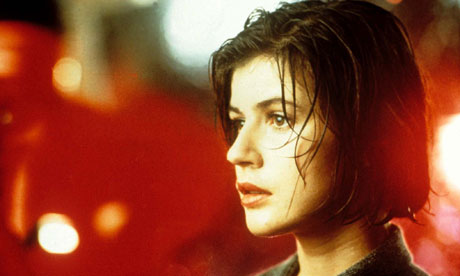Cornetto!
They've survived through the onslaught of shambling zombies, have fought against a band of dead-eyed villagers, and have even starred together in that alien film entitled "Paul". To say that Simon Pegg and Nick Frost, whose on-screen partnership traces as far back as the 1999 TV series "Spaced", have done everything there is to do as far as 'genre' comedy films are concerned is an understatement, and so is saying that my anticipation about this film is merely high. Being a big, big fan of "Shaun of the Dead" and "Hot Fuzz" (I have also seen episodes of "Spaced" and quite loved them as well), I felt a stab of definite fanboy defeat after finding out that this film will not be shown in theaters here in the Philippines. "The World's End", the final chapter in Edgar Wright's "Blood and Ice Cream" trilogy (or alternately called as the "Cornetto" trilogy), has giant boots to fill, especially considering the fact that the two preceding films were runaway successes both critically and commercially.
Like Nolan's "The Dark Knight Rises", "The World's End", pre-release, is in a very delicate position of either delivering or flat-out failing. And if I'm Edgar Wright, I wouldn't forgive myself if the film bombs, for it will forever be a blemish on my resume and will further support most people's claims that trilogies can only succeed so much. Fortunately, however, just like the first two films, this one's just as fun if a little less clever. Granted, the film is easily the weakest of the three, but it is thankfully still the kind of product that I would always expect from the Wright-Pegg-Frost combo. Honestly, I want more from these three.
Though the film, in its entirety, is in every way just as visually dazzling as "Shaun" and "Hot Fuzz", what lacks is the utter ingenuity in the storytelling department, even if the film is quite original in bringing about the apocalypse within the context of such a harmless pub crawl. But aside from that and the intensely enjoyable performances by the whole cast, the film is surprisingly without much narrative swerves, bar the unexpectedly elegiac ending, of course.
What elevates the film, though, in terms of quality, is the way how Simon Pegg has (almost) single-handedly carried the film through with his jumpy gift for comedy. It's also interesting to note that he has essentially switched characters with Nick Frost, who we know see as a straight-laced, no-nonsense character, while he is now the alcoholic slacker of a character that the latter is more accustomed in playing. His name is Gary King, a directionless drunkard/recovering addict who has cunningly deceived his now white-collared friends (played by Nick Frost, Martin Freeman, Paddy Considine, and Eddie Marsan) into attempting with him once more the epic pub crawl that they have failed to finish some 20 odd years ago.
For his friends, the pub crawl is merely a cordial outlet to catch up with each other, the beer pints being secondary. For King, the crawl is everything that's left of his wasted life and his obviously damaged liver. But for the mysterious populace of the town in which the pubs are situated, well, this little beer-drinking escapade is an itch that needs to be scratched. After all, what nuisance a bunch of drunkards can really be, especially if they will be but foils to a very sci-fi master plan, right? So, yes, what ensues is a combination of desperate hilarity, alcoholic frenzy, and blue-blooded (literally) eschatological badassery. Oh, and did I mention that the film involves some type of extraterrestrial craziness that perfectly complements, in an odd way, the film's display of inebriated fun?
"The World's End", despite its shortcomings, is mischievous and wildly fast-paced, and is Wright's thoroughly enjoyable attempt in picturing the funny side of both the apocalypse itself and the days that follow; that is with pints and pints of booze, some dose of melodrama, and a bunch of paranoia-inducing quips. And trust me, the film's final 5 or so minutes alone has enough strength to completely blow the entirety of Roland Emmerich's world-destroying oeuvre out of the water. It's that good of an 'end of the world' film, that effective of a comedy-drama hybrid, and that powerful a playful cinematic vision of what's in store for humanity in the end is. And as much as it is a stand-alone science fiction film, it's also uninhibited in paying a nice tribute to its obvious influences, namely "The Day the Earth Stood Still" and "The Invasion of the Body Snatchers". When you've seen that robot near the end, haven't you immediately thought of Gort? Did you not unconsciously insinuate that Donald Sutherland may appear as one of the aliens? And, finally, did you not feel a little "Twilight Zone-y" during the climactic confrontation between King and the 'alien boss' (I'll just call it that)?
With all of its unconscious references to classic science fiction films, its almost parable-like unraveling of the characters' friendship, and its quick-witted script that just won't quit with its well-formulated banters, "The World's End" may just be one of the most entertaining and unexpectedly emotional films of 2013. What's only slightly disappointing, though, is the fact that it's not really as 'great' as "Shaun of the Dead" and "Hot Fuzz". But hey, if this is how the world will really end, count me in as one of those crazed (not to mention bearded and hygienically-challenged) doomsday prophets that will excitedly warn you about it.
FINAL RATING














